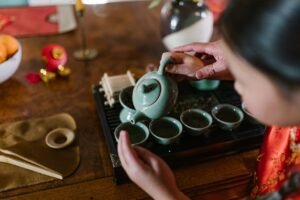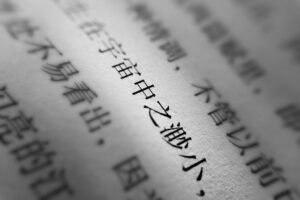Table of Contents
Toggle着 Zhe suggests that the activity is either an “accompaniment to another action”.
妈妈站着做饭。Māmā zhànzhe zuò fàn. (Mom stood cooking.)
妹妹哭着要我陪她玩游戏。Mèimei kūzhe yào wǒ péi tā wán yóuxì. (My sister cried and asked me to play games with her.)
孩子笑着接过棒棒糖。Háizi xiàozhe jiēguò bàng bàng táng. (The child took the lollipop with a smile.)
Or an “action-resulting state”:
我家门口放着一把雨伞。Wǒjiā ménkǒu fàngzhe yī bǎ yǔsǎn. (There is an umbrella in front of my house.)
桌子上摆着一个花瓶。Zhuōzi shàng bǎizhe yīgè huāpíng. (There is a vase on the table.)
墙上挂着一幅中国画。Qiáng shàng guàzhe yī fú zhōngguóhuà. (There is a Chinese painting on the wall.)
Note: Most verbs that describe wearing garments can be suffixed with 着 zhe:
戴着帽子dàizhe màozi (wearing a hat)
穿着外套chuānzhuó wàitào (wearing a coat)
穿着袜子chuānzhuó wàzi (wearing socks)
披着围巾pīzhe wéijīn (wearing a scarf)

Although (正)在 (Zhèng) zài and 着 zhe have similar meanings, the following examples show how they differ.
他正在穿鞋子。Tā zhèngzài chuān xiézi. (He is putting on shoes.)
他穿着鞋子。Tā chuānzhuó xiézi. (He wears shoes.)
我正在戴围巾。Wǒ zhèngzài dài wéijīn. (I am wearing a scarf.)
我戴着围巾。Wǒ dàizhe wéijīn. (I wear a scarf.)
When an adverbial expression modifies a verb – 着 zhe phrase, the usage of 在 zài and 着 zhe are pretty similar.
她们高高兴兴地做着蛋糕。Tāmen gāo gāoxìng xìng de zuòzhe dàngāo. (They are happily making cakes.)
她们高高兴兴地在做蛋糕。Tāmen gāo gāoxìng xìng de zài zuò dàngāo. (They are happily making cakes.)
The two lines above both indicate “they are/were making cake happily.” If there is a difference, the first emphasizes a continuing state, whereas the second suggests a continuous action.
着 zhe may also be included in phrases that describe actions that are now taking place:
他们在做着饭。Tāmen zài zuòzhe fàn. (They are cooking.)
学生在上着中文课。Xuéshēng zài shàngzhe zhōngwén kè. (Students are taking Chinese classes.)
孩子们在玩着玩具。Háizimen zài wánzhe wánjù. (Children are playing with toys.)







